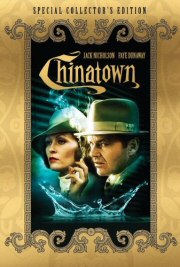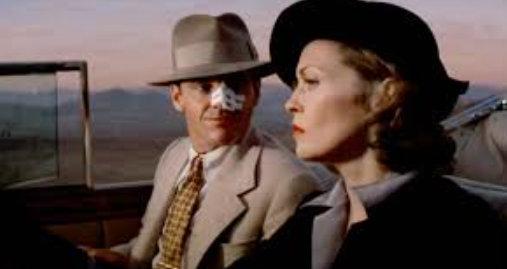 Another classic movie, another dilemma. After all, how does one talk about Roman Polanski’s “Chinatown” when so much has already been said? The film is not only one of the best of its decade, but is also widely considered the finest film noir ever made. It’s presence at the 1975 Academy Awards is certainly proof of that, but despite its whopping 11 nominations, the film took home only one Oscar – for Best Original Screenplay. So what exactly happened?
Another classic movie, another dilemma. After all, how does one talk about Roman Polanski’s “Chinatown” when so much has already been said? The film is not only one of the best of its decade, but is also widely considered the finest film noir ever made. It’s presence at the 1975 Academy Awards is certainly proof of that, but despite its whopping 11 nominations, the film took home only one Oscar – for Best Original Screenplay. So what exactly happened?
Film critics would usually call shenanigans on such a lucid snub, but that was hardly the case in ‘75. Francis Ford Coppola’s “The Godfather: Part II” was also released that year, and while “Chinatown” would have likely cleaned house against any other opponent, it had no chance against the sequel to the much-loved mob drama. Still, it was probably the only time in history that someone actually considered second place an honor, and I can’t think of a better film than “Chinatown” to fill that role.
Jack Nicholson stars as Jake Gittes, a private detective in pre-war Los Angeles who’s just been hired to investigate city water engineer Hollis Mulwray (Darrell Zwerling) after his wife suspects him of having an affair. When news hits the front page the next day, however, the real Mrs. Evelyn Mulwray (Faye Dunaway) appears in Jake’s office denying she ever hired him to spy on her husband – that is, until Mr. Mulwray ends up dead. Curious as to why Mulwray would be murdered mere days after breaking news on the faux affair, Jake digs deeper and uncovers a conspiracy involving a water company owner (John Huston) and his plans to create a citywide drought – all for the purpose of buying land cheap and selling it for millions more.
 Of course, anyone who’s seen the film knows the plot is much more complex, but that’s what makes “Chinatown” so unique. Not only does it require the audience to pay full attention, but it rewards them with an engaging detective mystery that Raymond Chandler would be proud of. You’d be hard-pressed to find an experience like it in present-day cinema, and while Curtis Hanson’s 1997 noir “L.A. Confidential” comes close, neither Guy Pearce nor Russell Crowe command the screen quite like Nicholson. Coming off back-to-back Oscar nominations for his work in “Five Easy Pieces” and “Easy Rider,” Nicholson was at the top of his game, and while many might point to his Oscar-winning role in “One Flew Over the Cuckoo’s Nest” as the best of his career, it’s his work in “Chinatown” that remains the actor’s most accessible performance to date.
Of course, anyone who’s seen the film knows the plot is much more complex, but that’s what makes “Chinatown” so unique. Not only does it require the audience to pay full attention, but it rewards them with an engaging detective mystery that Raymond Chandler would be proud of. You’d be hard-pressed to find an experience like it in present-day cinema, and while Curtis Hanson’s 1997 noir “L.A. Confidential” comes close, neither Guy Pearce nor Russell Crowe command the screen quite like Nicholson. Coming off back-to-back Oscar nominations for his work in “Five Easy Pieces” and “Easy Rider,” Nicholson was at the top of his game, and while many might point to his Oscar-winning role in “One Flew Over the Cuckoo’s Nest” as the best of his career, it’s his work in “Chinatown” that remains the actor’s most accessible performance to date.
Spending more than half the film wearing a bandage over his nose (a result of running into a pair of goons with a switchblade, one of which is played by Polanski), Nicholson’s performance is only heightened by the striking detail made to his face. Even the wound itself has a life of its own throughout the course of the story, starting out as a messy white pile of gauze and eventually turning into an off-putting stitch-job. In fact, this single image is perhaps the most famous memory that anyone has of “Chinatown” – and that’s saying a lot, considering the many quotable quotes that appear within the dialogue.
It’s funny to think that had this film been made today, the lead actor would have argued against wearing such a bandage for fear that his loyal fans wouldn’t be able to recognize his face. Of course, the film probably would have never even made it past conception in today’s cutthroat industry, and that’s what ultimately makes “Chinatown” so great. Along with holding its place as one Hollywood’s greatest cinematic achievements, the film still looks like it was made yesterday. A compliment if there ever was one for a film that truly defines the term classic.
5 / 5 Stars
Starring: Jack Nicholson, Faye Dunaway, John Huston, Darrell Zwerling, Diane Ladd, James Hong, Perry Lopez
Director: Roman Polanski
Special Collector’s Edition DVD Review:
The single-disc re-release of “Chinatown” is disappointingly sparse, and though it would have been nice to hear a full-length commentary with either Polanski or Nicholson, the included cast/crew interviews do a nice job of exploring the history of the film. An hour-long documentary broken into three parts – “The Beginning and the End,” “Filming” and “The Legacy” – covers everything from the origins of Robert Towne’s script to the on-set battles between writer, producer and director. It’s not much, but at least it’s something.


